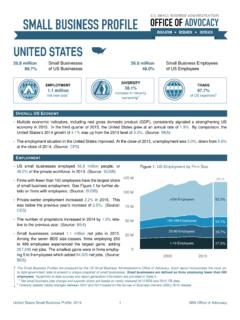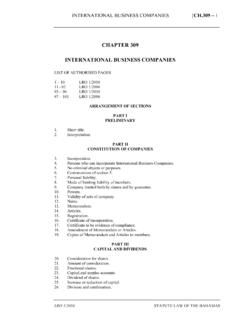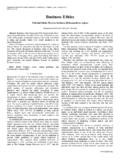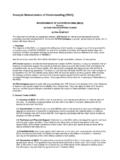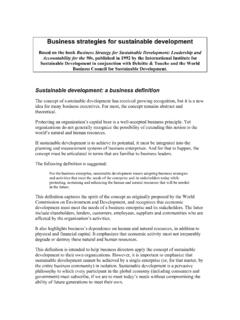Transcription of Ethics and Social Responsibility in International Business
1 Ethics and Social Responsibility in International Business 1 Ethics and Social Responsibility in International Business Ethics and Social Responsibility in International Business 2 Table of Contents Introduction .. 3 Defining Ethics and Social Responsibility .. 3 Do Countries with Lower Ethical Views Attract Businesses? .. 5 Can Ethical Business Practices be Applied Globally? .. 7 Which organizations are safe guarding ethical practices and is it working? .. 9 What are the Ethical and Social Responsibilities of Outsourcing? .. 12 What is Outsourcing? .. 13 Outsourcing is 15 What a Company Needs to Know Before Outsourcing .. 17 What Are the Facts Regarding Child Labor?.. 18 Child Labor Global 18 Conclusion .. 21 Ethics and Social Responsibility in International Business 3 Introduction Any successful endeavor starts with the customer and not only understanding the problems customers are trying to solve but also how these problems relate to their needs.
2 With the growing global economy today s customers are becoming more of a mix of International and domestic consumers. This International demand has captured the interests of companies such as Apple, Pfizer, Microsoft and other alike. According to the World Bank it is expected that GDP on a global scale will grow by in 2010 and in 2011. Thus, today's companies are trying to gain a competitive advantage by providing products or services to meet the needs of the International consumer. To enable these companies to successfully develop and market their products and or services internationally a clear understanding of the Social and ethical responsibilities of all stakeholders must be established. These ethical and Social standards need to be embedded into an organization s DNA allowing a more predictable and positive impact on all.
3 To help companies establish the appropriate ethical and Social guidance in order to a achieve a successful infiltration into the International market this research paper will be addressing the following questions: Do countries with lower ethical views attract businesses? Can Ethical Business Practices be applied Globally? Which organizations are safe guarding ethical practices and is it working? How will Ethics and Social Responsibility impact the world of tomorrow? Defining Ethics and Social Responsibility According to the Webster dictionary Ethics is "the discipline dealing with what is good and bad or right and wrong or with moral duty and obligation" while Social Ethics and Social Responsibility in International Business 4 Responsibility is moral, legal or mental accountability . Together, these two terms make up the foundational principles and character, which drive the decisions a company and individual present.
4 Ethics sometimes get confused with a person s feelings; however, doing what is right may differ from one s feelings. In fact, feelings frequently deviate from what is ethical ( ). In reality, Ethics and Social Responsibility is the study and governance of one s morals by which acceptable standards are based on. The combinations of the two make up the corporate values company s stand for. These values in turn underpin the leadership characteristics and purpose of a company, which enable the following: 1. Building an Organization that truly makes a difference in the marketplace 2. Becoming a leader of great purpose; and 3. Bringing your purpose to life so that your constituents know exactly what you stand for. (Spence, pg. 4) When instituting an ethical framework eight basic steps are required to fulfill the intent. These steps are illustrated in Figure 1.
5 Figure 1 - The Ethical Framework ( ) Ethics and Social Responsibility in International Business 5 When launching your company s ethical framework employees should remember, great leaders do not adopt a purpose to increase their profitability. They believe deeply in the purpose and the profitability follows (Spence, pg. 296). Do Countries with Lower Ethical Views Attract Businesses? There is evidence that some countries will sacrifice wage and benefit provisions, work-place safety regulations or maximum workweek provisions in order to make employment competitively attractive to multinational corporations (Shearer pg542). If we accept our definition of Ethics then we can conclude that these actions represent low ethical values. The question is do these low ethical values attract Business . In some respects the answer is yes but overall the answer is no.
6 The increase in competition amongst developing countries for foreign investments can lead to a race to the bottom where states compete by offering an environment with the least amount of regulations (Winston pg73). While most multinational corporations do not generally commit willful human rights violations they are often indirectly complicit in such abuses. For example, due to the current and forecast increasing demand for rubber, Chinese companies have secured deals in Myanmar to produce rubber trees. Myanmar suffers form severe localized food insecurity according to the FAO (Daniel pg4). It appears that farmers are being forcibly displaced to make room for Chinese investment without any objections from the Chinese enterprises involved (Daniel pg4). The United Fruit Company relied on a tremendous amount of manipulation of land use rights in Central America to maintain its market dominance in banana production.
7 In order for the company to maintain its unequal land holdings, they had to get government concessions. These concessions were often at the detriment of the Ethics and Social Responsibility in International Business 6 local people (Daniel pg11). United Fruit Company also found it necessary to become involved in local politics even though they were an American company. A banana republic signifies a country that is politically unstable, dependant on limited agriculture and ruled by a corrupt elite class that is heavily influence by multinational organizations. The term banana republic came into existence because of multinational companies taking advantage of a host countries low ethical environment (Daniels pg11). Despite the evidence above there is even more substantial evidence that countries with lower ethical views do not attract businesses.
8 There is little evidence that corporations direct their investment to countries that have lower labor or environmental standards. The research arms of multiple International organizations such as the OECD and the World Bank, have conducted studies investigating the claims that trade liberalization reduces regulatory standards, and found no support for the proposition (Kucera pg33). The balance of the evidence goes against conventional wisdom in that it suggests that foreign direct investment tends to be greater in countries with stronger worker rights. A strong reason for this is that countries with higher labor standards tend to achieve higher economic growth. Higher economic growth is a chief attractant of foreign direct investment (Kucera pg34). In a recent survey of several hundred mangers of multi-national corporations and International experts were asked to rank the importance of certain criteria with regard to foreign direct investment locations.
9 The rankings were 0 to 5 with 0 not important and 5 very important (Kucera pg35). Market potential ranked highest, political and Social stability ranked fourth while the cost of labor was ranked ninth (Kucera pg36). The full rankings are shown in Appendix A. There is also evidence that although capital outflow appears to be sensitive to rising Ethics and Social Responsibility in International Business 7 regulation costs, the investment recipients are countries with comparably stringent environmental standards (Kagan pg1). Data on foreign direct investment in developed and developing countries reveals that firms invested a greater percentage of pollution-intensive industries in the countries with stricter environmental standards (Kagan pg 2). Given the importance of industrialized country markets, many multi-national corporations tend to operate globally with the most stringent standards calculating that in the future most developing countries will adopt these same standards (Kahler pg19).
10 There is also a problem with the race to the bottom hypothesis. The race to the bottom hypothesis makes several strong assumptions about the political economy of the nation-state in a world of perfect capital mobility (Kahler pg7). A major assumption regarding the race to the bottom hypothesis is the assumption that corporations will always prefer lower regulatory standards. Corporate preferences are more nuanced than a simple preference for abject deregulation. Firms will naturally push for stringent regulations to protect corporate assets. For example, multinationals especially entertainment, computer, pharmaceutical, and chemical companies strongly supported the establishment of an intellectual property rights regime within the WTO. Why was there strong corporate support for a significant ratcheting up of global standards in this issue area?

